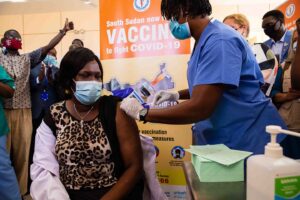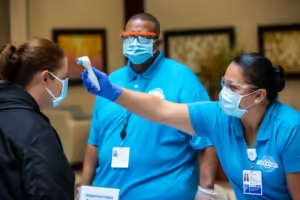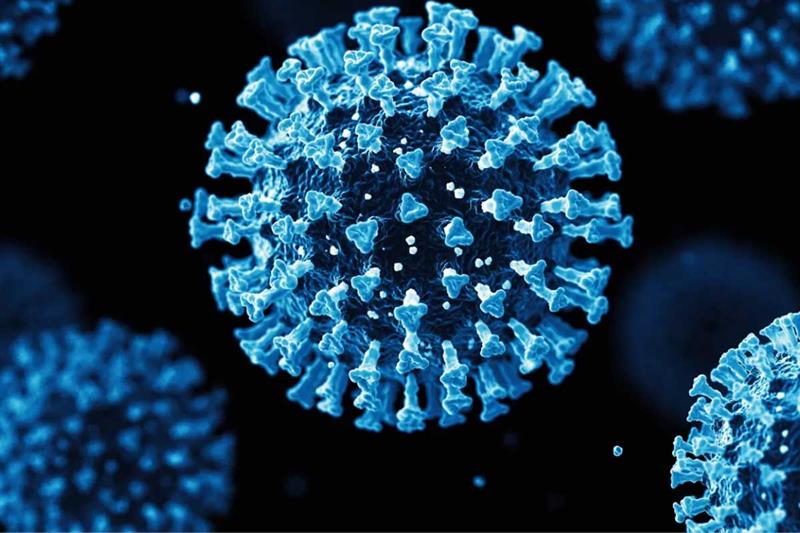As the world continues to navigate the complexities of the COVID-19 pandemic, a new variant has emerged, posing fresh challenges to global health systems, governments, and individuals. This new variant, which has been detected in several countries, has brought renewed attention to the need for vigilance, adaptation of public health strategies, and global cooperation. In this article, we’ll explore the origins of the new variant, its impact on the healthcare system, how it compares to previous variants, and the steps being taken to control its spread.
The Emergence of the New Variant
The emergence of new variants is not unexpected in the course of a global pandemic. Viruses like SARS-CoV-2, the virus responsible for COVID-19, constantly mutate as they replicate. Some of these mutations can make the virus more contagious, allow it to evade immunity from vaccines or prior infections, or increase the severity of the disease it causes. This new variant, identified as [insert variant name], has raised alarm due to its rapid spread and unique mutations.
First detected in [insert country], the new variant has since been reported in several other regions, including [insert countries]. Scientists believe that the mutations in this variant are primarily in the spike protein, the part of the virus that allows it to enter human cells. The changes in the spike protein can affect how easily the virus spreads, its resistance to treatments, and its ability to bypass immune protection.
Increased Transmission and Impact on Public Health
One of the most concerning aspects of the new variant is its increased transmissibility. Early data suggests that this variant is more contagious than previous strains, potentially spreading faster within communities. Epidemiologists are closely monitoring the situation to understand the extent of this increased transmission and its implications for public health.
With the higher transmission rate, there is a risk of overwhelming healthcare systems, especially in countries where vaccination rates remain low or public health resources are already strained. Hospitals in several regions have reported a surge in COVID-19 cases attributed to the new variant. Intensive care units (ICUs) are filling up once again, and some hospitals are facing shortages of medical supplies and personnel.
The increase in transmission also raises concerns about the ability of existing public health measures, such as mask mandates, social distancing, and contact tracing, to control the spread effectively. Governments are being urged to re-evaluate their strategies and consider re-implementing restrictions in areas where the variant is spreading rapidly.
Vaccine Effectiveness and the New Variant

Vaccination remains one of the most effective tools in combating COVID-19, but the emergence of new variants has sparked concerns about the continued efficacy of existing vaccines. The new variant’s mutations may reduce the neutralizing power of the antibodies generated by vaccines, leading to breakthrough infections in vaccinated individuals.
However, experts emphasize that even if the variant partially evades vaccine-induced immunity, vaccines still provide significant protection against severe disease, hospitalization, and death. Booster shots may become necessary to increase immunity against the new variant, especially in high-risk populations such as the elderly and immunocompromised individuals.
Vaccine manufacturers are also working on updated vaccines specifically targeting this variant. These next-generation vaccines may offer more robust protection against emerging variants, and they could play a critical role in ending the pandemic. In the meantime, public health officials continue to encourage widespread vaccination as the best defense against severe outcomes from COVID-19.
Reinfections and Natural Immunity
Another area of concern with the new variant is the potential for reinfections among people who have previously had COVID-19. Natural immunity from prior infection has been shown to offer some protection against re-infection, but the mutations in the new variant could allow it to bypass this immunity.
Preliminary studies suggest that individuals who were infected with earlier strains of the virus may be at risk of reinfection with the new variant, although these cases tend to be less severe. Nonetheless, the possibility of reinfection highlights the importance of continued adherence to public health measures, even for those who have recovered from COVID-19.
The Global Response to the New Variant

As the new variant spreads across borders, the global response has become increasingly coordinated. International organizations such as the World Health Organization (WHO) and the Centers for Disease Control and Prevention (CDC) have issued alerts and provided guidance to governments on how to respond.
Several countries have reintroduced travel restrictions in an attempt to slow the spread of the new variant. Border controls, mandatory quarantine periods, and negative test requirements have been put in place to limit the international transmission of the virus. However, public health experts warn that travel restrictions alone are unlikely to prevent the spread and that a comprehensive strategy is needed to address the situation effectively.
Governments are also ramping up their efforts to boost vaccination rates, particularly in regions where uptake has been slow. In some countries, booster shots are being prioritized for healthcare workers, the elderly, and other vulnerable groups. Additionally, public information campaigns are being rolled out to encourage vaccine-hesitant populations to get vaccinated.
On the research front, scientists are conducting genomic sequencing to better understand the new variant’s behavior. This involves analyzing the genetic material of the virus to track its mutations and identify any changes that could affect transmissibility, severity, or vaccine resistance. The data collected from genomic sequencing will help inform public health strategies and vaccine development moving forward.
Public Health Measures and Their Role
In light of the new variant, public health experts are urging individuals and communities to remain vigilant. While vaccination remains critical, it should be complemented by other preventive measures to slow the spread of the virus. Masking, social distancing, hand hygiene, and avoiding crowded spaces continue to be effective in reducing transmission.
In some countries, mask mandates have been reinstated in public indoor spaces, regardless of vaccination status. Social distancing measures, such as limiting the size of gatherings and ensuring proper ventilation in indoor spaces, are also being reinforced. These measures, although not popular in all circles, play a vital role in controlling the spread of the virus and protecting vulnerable populations.
Testing and contact tracing have also regained importance with the emergence of the new variant. Rapid identification and isolation of positive cases are essential to prevent outbreaks, especially in high-risk environments like schools, nursing homes, and densely populated areas. Governments are increasing testing capacity and encouraging individuals with symptoms or known exposure to get tested.
Looking Ahead: Containing the New Variant

The spread of the new variant underscores the ongoing nature of the pandemic and the need for long-term planning. While the world has made significant progress in managing COVID-19, the emergence of new variants presents an ongoing challenge. Experts warn that as long as the virus continues to circulate widely, additional variants are likely to emerge, potentially complicating efforts to achieve global control of the pandemic.
Global cooperation will be essential in addressing the spread of this new variant. No country is immune to the effects of a more contagious and potentially vaccine-resistant strain. Governments, international organizations, and the scientific community must work together to share data, resources, and vaccines in the fight against COVID-19.
In the long term, public health systems will need to adapt to the evolving nature of the virus. This may include regular updates to vaccines, the development of antiviral treatments, and the implementation of more robust global health surveillance systems to detect and respond to new variants more quickly.
Conclusion
The emergence of a new COVID-19 variant is a stark reminder that the pandemic is far from over. While vaccines provide strong protection against severe disease, the mutations in the new variant pose challenges that require swift and coordinated action. Increased transmissibility, potential vaccine resistance, and the possibility of reinfection highlight the need for a multi-pronged approach to managing the virus.










Leave a Reply